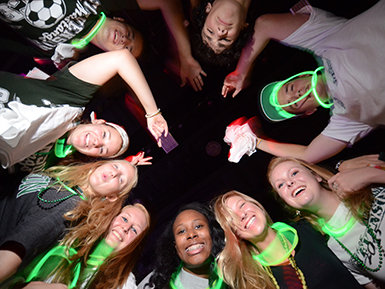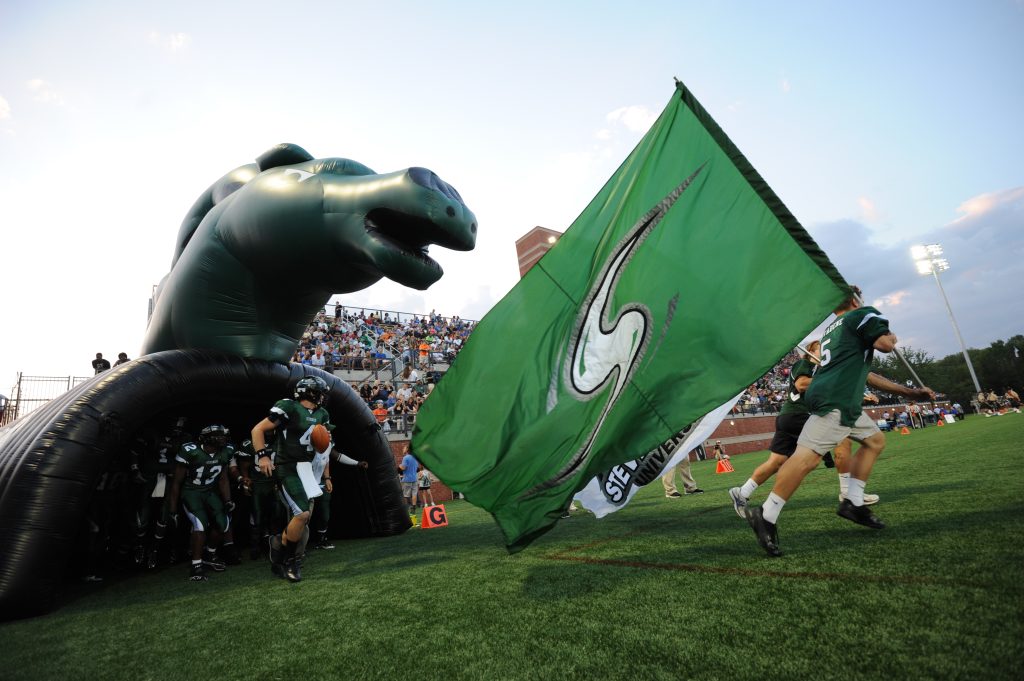Stevenson University supports the use of Emotional Support Animals (ESAs) on campus as a reasonable accommodation for students with disabilities to allow equal access to educational opportunities and the ability to use and enjoy Stevenson University on-campus housing under Title VIII of the Civil Rights Act of 1968 (Fair Housing Act). Any questions regarding an ESA should be directed to the Office of Disability Services.
An Emotional Support Animal is a considered a companion animal that provides therapeutic benefit to an individual with a documented disability. ESAs are not pets and they are not service animals. Unlike a service animal, the ESA is not individually trained to do work or perform tasks for the benefit of an individual with a disability nor does the animal accompany a person with a disability at all times. ESAs are only approved to be in and around a student’s campus residence.
Students at Stevenson University wishing to request the accommodation of an ESA must meet with a staff member within the Office of Disability Services (ODS), submit a request for the accommodation, and provide documentation that clearly meets Stevenson’s guidelines. Students should make the request as soon as possible. The request for an ESA accommodation during a given semester may not be able to be implemented until the following semester. The University requests that students provide reasonable advance notice (60 days) in order to effectively assess a request and manage the implementation of any ESA accommodation.
ESA documentation should be on official letterhead and signed by a licensed professional. The professional must have comprehensive training in the differential diagnosis of mental disorders and direct experience in diagnosis and treatment of college students. Qualified diagnosing professionals would include licensed psychologists or neuro-psychologists, psychiatrists, licensed clinical social workers, or other professionals with such training and expertise in the diagnosis of mental disorders. Documentation must be current and demonstrate an established therapeutic relationship between the professional and student. It must include detailed information addressing the following five points:
- Diagnostic statement identifying the nature and extent of the impairment and how the diagnosis is supported by the criteria set forth in the DSM-5.
- Detailed description of the current functional impact of the impairment without any mitigating treatment. Describe how the impairment limits one or more major life activities.
- Description of the expected progression or stability of the impact of the impairment over time.
- Evidence of a direct relationship between the disability and the assistance the animal provides. (How does the animal’s support alleviate at least one of the identified effects of the existing disability?)
- Evidence that the animal is medically necessary to afford the student an equal opportunity to use and enjoy Stevenson housing.
Once an ESA has been approved through Stevenson’s Office of Disability Services, the student will need to provide a completed Veterinary Verification Form confirming that the animal is in good health, up to date on all required and recommended vaccinations, and is free from diseases or conditions communicable to humans. The student will also be required to meet with staff in Residence Life to review, complete, and sign an Emotional Support Animal Agreement, specifying and agreeing to all details required by Stevenson University regarding the student’s responsibilities for care and control of the ESA, conditions of care and supervision, the specific housing areas in which the ESA will be allowed, student responsibility for property damage or personal injury caused by the ESA, circumstances justifying removal of the ESA, and other Stevenson conditions and student responsibilities associated with the presence of the ESA in campus housing.
- An Emotional Support Animal in University housing must be under the full control of its handler at all times. The animal shall have a harness, leash or other tether, unless using such a tether is not feasible due to the student’s disability. In those cases, the student is expected to maintain control of the animal via an alternative method, such as voice control or signals. The animal shall be crated whenever the student is not present in their campus housing space.
- Emotional Support Animals are restricted to the student’s individual bedroom and to designated outside areas for natural relief.
- If a student with an Emotional Support Animal leaves campus overnight, the student must bring the animal with them. Emotional Support Animals may not be left in the care of a roommate or another student on campus overnight.
- The student is responsible for ensuring that the animal remains in good health while residing in Stevenson housing, and for ensuring that the animal is properly groomed. Students may not use Residence Life suite/apartment showers to clean his/her/their animals. Students are required to keep his/her/their animals clean and such bathing and grooming activity shall occur off campus. Students shall maintain the animals so that other individuals are not unreasonably exposed to odors from the animals. Students approved to have an ESA should apply flea and tick prevention products to the animal on a regular basis.
- The animal must be housebroken (i.e., trained so that it controls its waste elimination, absent illness or accident). The student is responsible for ensuring the cleanup of the animal’s waste. After a student receives approval to bring an ESA into Stevenson housing, Residence Life staff will tell the student where the designated relief areas for the animal are located, if applicable. Waste must be bagged and discarded in receptacles designated by Residence Life. Students who maintain ESAs should dispose of used cat or other litter in a sealed bag in an outside trash dumpster. Crates and litter boxes must be placed on mats to minimize contamination of carpeted and other surfaces.
- The student is financially responsible for any damage caused by the animal to Stevenson housing, including, but not limited to, damage to carpets, furniture or walls beyond reasonable wear and tear to the same extent that other individuals are responsible beyond reasonable wear and tear. If fleas, ticks or other pets are detected in the student’s residence, it will be treated by a University-approved pest control service. The student will be billed for the expense of any pest treatment.
- The student is liable for any damages caused by the actions of the animal (bites, scratches, etc.), waives any claim against Stevenson and agrees to indemnify Stevenson and its employees, officers and agents in any claim or suit arising from the harm caused by the animal. Damages and extraordinary cleaning caused by the animal are the responsibility of the owner. Replacement or repair of damaged items will be the financial responsibility of the owner.
- The ESA is allowed in University housing only as long as it is necessary because of the owner’s disability. The owner must notify the Office of Disability Services in writing if the ESA is no longer needed or is no longer in residence.
No animal may be moved into the residence halls until the student has been approved for an ESA accommodation by the Office of Disability Services. Should an animal be moved in prior to the decision, the student risks their request being denied for failure to honor the ESA Policy.
If the owner fails to comply with the above conditions, the University may pose additional restrictions or exclude the animal from the residence hall. Restrictions or exclusions will be considered on a case-by-case basis in accordance with applicable laws.
Exclusions
The University may not approve or may require a student to remove an animal from University housing if:
- The animal is or becomes prohibited by the Baltimore County Health Department.
- The animal’s presence otherwise violates individuals’ right to peace and quiet enjoyment.
- The animal is not housebroken or is unable to live with others in a reasonable manner.
- The owner has not abided by current city, county, and state ordinances, laws, and/or regulations pertaining to licensing, vaccination, and other requirements for animals.
- The animal poses or has posed in the past a direct threat to the individual or others such as aggressive behavior towards or injuring the individual or others.
- The animal causes or has caused excessive damage to housing beyond reasonable wear and tear.
- The animal’s presence results in a fundamental alteration of a University program.
- The animal imposes an undue financial or administrative burden on the University.
- The animal is found to be neglected or mistreated and prompt corrective action is not taken.
- The animal is physically ill.
- The animal is unreasonably dirty.
- The owner does not ensure the cleanup of the animal’s waste.
- The owner does not comply with any of the other owner responsibilities set forth above.
In addition, at the discretion of the Director of Disability Services and Residence Life, animals that repeatedly disrupt others (e.g., barking excessively, growling, howling, etc.) may be required to be removed from the residence hall and/or campus. If the owner can change the behavior of an animal so that the animal does not have to be removed, then a written action plan must be submitted by the owner. The action plan must outline the action that will take place to alleviate the problems and also must give a deadline as to length of time the plan will take. Any action plan must meet the approval of the Director. The University also reserves the right to limit approval of proposed ESAs to animals that do not pose health or safety concerns, or would significantly disrupt the residence hall living environment for others.
Students who believe his/her/their emotional support animal has been improperly excluded may contact the Director of Disability Services at (443) 352-4920 or ODS@stevenson.edu to discuss his/her/their concerns. Stevenson will not retaliate against any individual because that individual has requested or received a reasonable accommodation in University housing.
(Approved February 2020)






